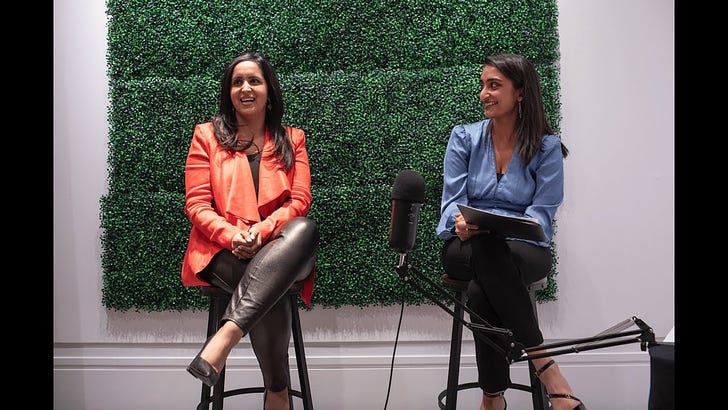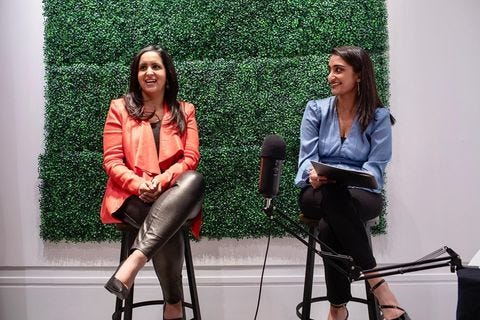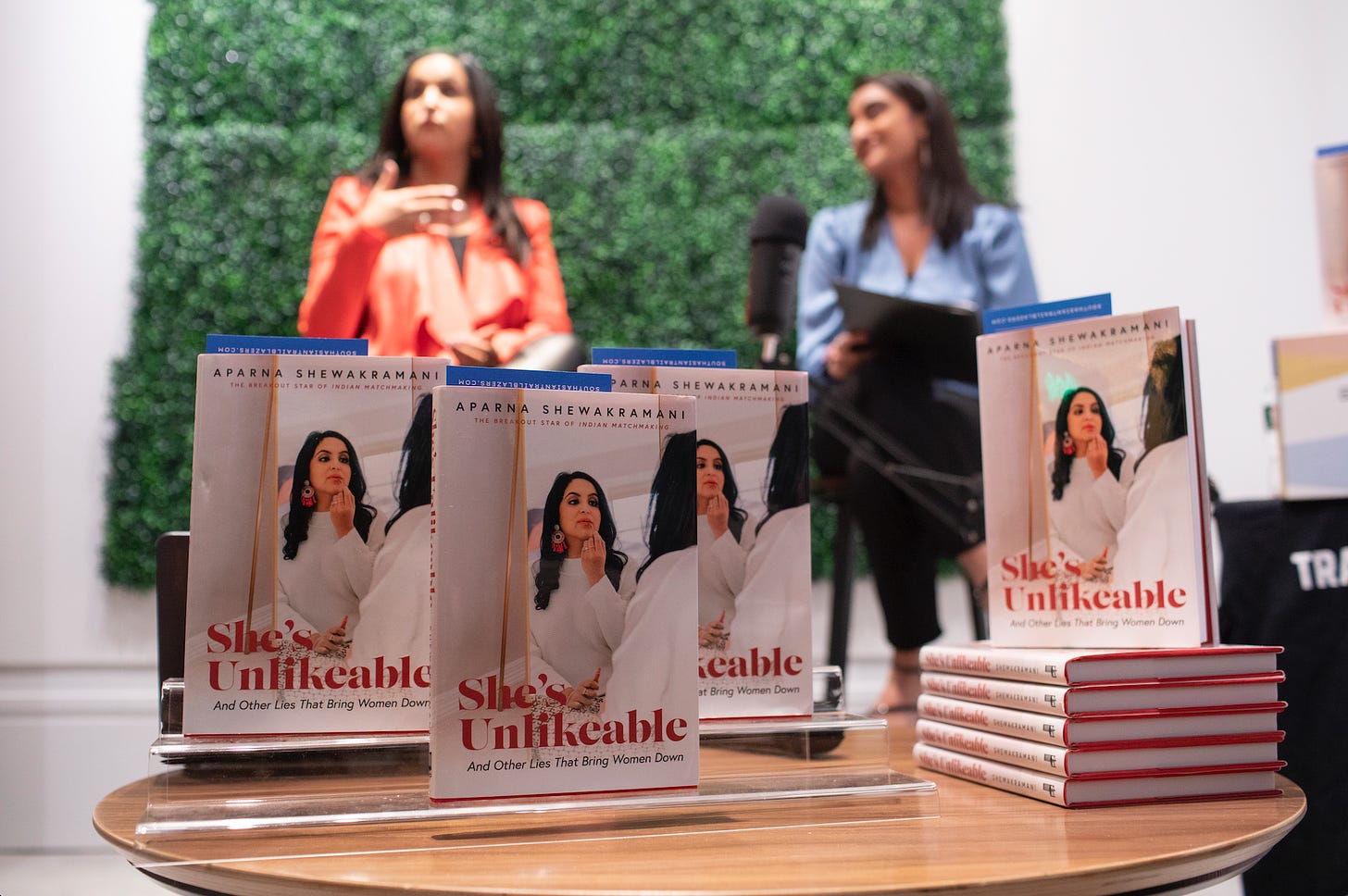Welcome! I’m Simi Shah, and every other week, I dive deep into the journey of a South Asian trailblazer. If you enjoy this issue, subscribe and write us a review.
Live Podcast🎙️ Indian Matchmaking Star and Author, Aparna Shewakramani
In this special edition of South Asian Trailblazers, I sat down with Aparna Shewakramani in front of a live audience, hosting our first-ever live podcast in New York City!
Aparna is the breakout star of Netflix’s hit series Indian Matchmaking — where she went from controversial character to overnight ambassador for women demanding to be heard. Our conversation marked the launch of Aparna's memoir, She's Unlikeable: And Other Lies That Bring Women Down.
Born in London, Aparna spent part of her childhood in Dubai, until she moved to Texas, where she lived for 25 years. A recent New York City transplant, Aparna spends much of her time traveling and is the founder of a luxury travel company called My Golden Balloon. She holds a J.D. from Vanderbilt Law School and a B.A. from Rice University. In both the book and this episode, Aparna recounts everything from surviving Hurricane Harvey to the ways in which her life changed after the show.
For updates on future live events, be sure to follow us on Instagram or LinkedIn!
Read on for excerpts or watch our live, unfiltered conversation now:
Sometimes, the best way to connect with our culture is to integrate it into our everyday lives. DesiiWay’s custom clothing, accessories, and homeware — from the Kem Cho mug to their Diwali holidays sweaters do exactly that. Live life the desi way. Get 15% off your order with the code: Trailblazers
Fast forward many months to July 16, 2020. Indian Matchmaking goes live on Netflix. You binge watch all the scenes you're in because you have a New Yorker Magazine interview at 9am the next day. How did you feel when you saw your portrayal on screen?
Six days prior, when the trailer came out, all these journalists were already talking about me on Twitter. Some of then had early access to the show. And people kept saying, ‘You're the star.’ And I thought that was weird because I ended up single.
Shekar, from the show, is one of my best friends. We're on the phone at 2am the night of the drop, and he keeps pressing refresh on the screen until he's says, ‘It's up, gotta go, bye.’ So I'm just sitting there by myself watching the show. And I was just so confused. I thought, ‘What? This isn't the show I made. This isn't the show I was told about.. I was like who's that girl…she's kind of b****. Like what…I’m still friends with Shekar, Dilip, Jay, all these guys that they made it seem like I disliked or disliked me.’
I was just confused. And then I have the New Yorker Magazine interview with Sima, and our Producer, Smriti, and based on what I’d heard Sima say about me and my mom, I felt ready to punch someone. But I'm so polite — which is also my flaw — so I just sit there on the Zoom, shell-shocked.
From then on, the process pretty much for the next week or two was me just grappling with what to say. I couldn't come out and say what what untrue — that's against my contract. I'm a lawyer — I can't speak out. You'd have to play this game of what you're allowed to say versus what actually happened. And that was very difficult for me. And to this day, it remains difficult. But in that period, especially, it was very difficult.
When I was reading your book, it struck me that you sincerely went on this show to find a life partner. There's a common turn of phrase in the Bachelor where someone says, ‘Oh, he’s not here for the right reasons.' Throughout this book, I can tell you’re there for the right reasons. And there are moments, like the parts where you talk about your date with Srini, where you can tell who wasn’t there for the right reasons. What gave you so much conviction in this process?
Season ones of shows are very interesting. You will never meet those type of people again — and that goes for any show. I was young when The Bachelor came out — that probably ages me — but those people from the early seasons are still married. They went on that show to find a partner… there was no social media frenzy around it. There wasn't this notion that the whole country was gonna watch you every Tuesday night. There was no mythic Chris Harrison at that point. He was there, but he wasn't a myth or a legend yet — he was just the host of the show.
I feel like that sentiment made season one of Indian Matchmaking really special. Whether I'm best friends with some of my castmates or even just acquaintances, I can tell you this: every single person on season one was really there looking. They were serious about it. We had promised them that we would get married at the end of the season if we found the right person. So these people were on a mission to find us the right people because wouldn't it have been great, if at least one of us had found someone and you could have seen the whole process on screen? From believing, and then hoping, and then realizing that hope, and then committing — that would have been a beautiful arc. It didn't happen. TBD if it will for many of us in season one, but I think it was interesting that they found this group. Watch season one of any show. You'll see this rawness, vulnerability, and hope in the contestants that you will never see again.
We're all here tonight for a reason, and that is your new book, She's Unlikable: And Other Lies that Bring Women Down. Why did you write this book?
I was very happy with those journalists who helped me tell my side of the story. But I was telling each one little snippets of my story. And I thought, ‘What if I could tell the whole story — not just my story on the show, but also the story of how I got here?’
When the show aired, I received thousands of DMs a day — literally. And I saw a recurring theme. It was women from all over the world. I'm talking Russia, Korea, other places I've never heard of. And they were like, ‘How did you become this way? And I thought… ‘Wait, how did I become this way?’ They asked questions like, ‘How did you sit there and look at this matchmaker and say those things to her? How did you process this? Why did you believe that you truly deserved a partner like that?’ The show doesn't tell you any of this… except maybe hints of it — and the things they hint at aren’t always…accurate.
I thought, ‘What if I just wrote a book with that question in mind?’ And so, the book is an interesting mix of my life leading up to the show, and then the process of the show sprinkled throughout it. I think it's important to do that, because that’s what makes it my story. It's my story, starting from a very young age. It's my story about my great grandmother. It's my story about my autoimmune condition and what it's like to have a chronic illness. It's my story about why I moved to New York City one day in my mid-30s, with no job and no real friends here. I wonder if many of those women may never read the book, but I think it needed to be out there.
I also thought about it and as I was researching the book, I thought, let me think of the other South Asian women who have written this kind of memoir. It was *crickets.*
South Asian women have written memoirs. I've loved them all. I've read most of them, but none of them are women in their 30s who are sharing that sometimes they're a little lost. Sometimes they're a little scared. Sometimes they're a little defeated. Sometimes they rose above it. Sometimes they found resilience, grit, and perseverance. And I'm very relatable in, say, ordinary ways. And maybe they're just ordinary to me. There's a relatability, to my story that I hadn't found in other memoirs yet. And I thought, this story is important, not mine, but this story of the relatable woman. And I thought, what if I started it, and then one day, we had a bookshelf full of our memoirs, and our stories. Because so many other women, believe they deserve to tell that story. And those stories exist. But with ours, there’s just silence.
If you didn't start a unicorn company, or if you weren't already famous like Priyanka Chopra — amazing memoir, by the way — but obviously, she has a platform. And it seemed like people felt that, if you weren't all of those things, then you didn't deserve to have your story told. That didn't seem right to me. Every other person is telling their story, why not a South Asian woman. And so I was really happy to be given this opportunity, and I realize I was given it because of the show. But now I'm hoping that when people read this, they start writing more. I want a bookshelf full of your stories. I will read them all.
Full episode on Youtube, Apple, Spotify, our website, or anywhere you stream podcasts!






